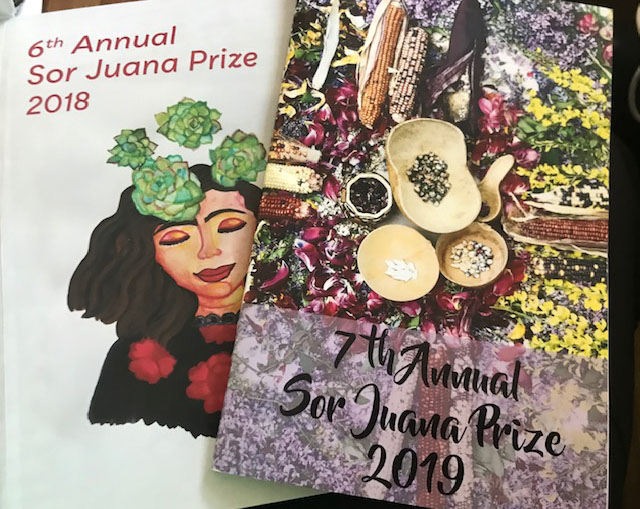Not Lost in Translation: Sor Juana Poetry and Art Celebration
Art
I’ve been to poetry events before, but never one where there was a language barrier in which I was the outsider. Attending the award ceremony for the 8th Annual Juana Inez de la Cruz (Sor Juana Poetry and Art Celebration), a Spanish-language poetry contest, on October 21, 2020 was something of a surreal experience for someone who doesn’t speak the language. The event was held over a zoom meeting to accommodate for the COVID-19 dilemma, and as the introductions began, I asked myself “How much will be lost in translation?” Despite the language barrier, the ceremony itself was a revel in deep emotions and a presentation of atavistic and personal history.
The 1st-place piece in the visual arts section, Michelle Franzoni Thorley’s painting “Ancestress–Mi Ninez,” exemplifies these qualities. The piece represents a feeling of being in between two worlds, with the artist’s ancestors watching over her. Through this work, Thorley connects with people she never knew, and that is a truly wonderful thing. Examining the dichotomy of the painting fills one with a deep wonder of the past and a reflection on the present.
Many of the artists at the Sor Juana contest did not wish to give English translations of their work, or explanations of their work, as it would muddy the meaning of their piece. Some context, beauty and purity could be lost inherently. But the message is not lost on non-Spanish speakers, as this choice speaks to the personal nature of what was on display and sheds light on a unique and thriving Spanish-language artistic tradition in Utah.
“Despite the language barrier, the ceremony itself was a revel in deep emotions and a presentation of atavistic and personal history.”
Within the fantastic visual artwork presented was a vibrant array of personality and mediums. In 2nd place was a digital art piece by Ivan Ortega titled “Nuestra Madre.” The work is about Mexico’s mixed origins and utilizes Meso-american and Catholic iconography. In 3rd place was Walter Cifuentes with his piece “Villa,” inspired by Mexican revolutionary hero Pancho Villa.
A highlight of the night was when the 2nd-place winner of the short story section, Mariangel Carta Lans, brought the host of the proceedings to tears with her reading of her work titled “De Deidades y Otros Sucesos Extraños.” For this piece in particular, as well as the other short stories presented that night, I simply sat back and listened to an orotund and mellifluous language unfold without understanding one bit of it, save for perhaps the most important part of any creative work; the feeling it imparts. As the ceremony moved forward, Lans’ piece was still receiving plaudits via the comment section of the zoom meeting, even after the reading of it was over. “Trabajo exellente” said Jorge Rodriguez, one of the judges, and the host of Park City’s only Spanish-language radio show, “Cada Domingo.” This is a moment where I wished more than anything that I knew the words—not just the translation, the original.
The poetry section was divided into two categories. Category one was for poets who learned Spanish as their first language, while category two was for those who learned the language later on in life and did not grow up speaking it. Again, I was hopelessly lost, but still having a splendid time. In category one, 2nd place was taken by Angeles Conejo Mosqueda with their piece “Inmigrantes.” In 3rd place, Maria Jose Toledo‘s “Indoamericano” chronicled her life coming to America from Chile, while also studying her roots. 1st place in category two was Peter L. Taylor and his piece “La Rosa de Sefarad” about the Sephardic Jews in Spain and Portugal.
“This is a moment where I wished more than anything that I knew the words—not just the translation, the original.”
Something that struck me as particularly moving throughout the night was the great care each artist put into their work. As each was presented, the artists created a world of meaning. Not a single piece of written word or visual art failed to evince a strong emotion from both the artist and the audience. About halfway throughout the ceremony, I realized that this may be the first time I had truly felt poetry, or at least the emotions behind the words. Whenever before I had cracked the spine on Allen Ginsberg’s collected poems, I would read and relate them to my life. In this instance however, I wasn’t able to do that, and I was left affected by the raw and visceral emotions of each artist. It was as if there wasn’t actually anything in the way between me, the listener and the presenter; there was just humanity.
In illation, this was a beautiful and heartfelt night. There are several pieces not mentioned here and I would encourage any reader, whether or not you speak Spanish, to pick up a copy of the collected works from this contest in order to check the rest of them out. If you would like to find a copy, email admin@artesmexut.org.

